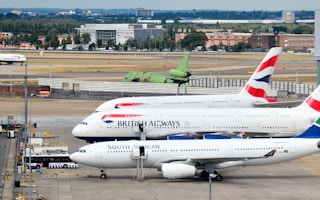If it is to achieve its target of net zero climate emissions by 2050, all UK airports must close by mid-century and the country will have to make other drastic and fundamental lifestyle changes, says a report from a research group backed by the government in London.
With the UK due to host this year’s round of crucial UN climate talks in Glasgow in November, a group of academics has embarrassed the British government by showing it has currently no chance of meeting its own legally binding target to reduce greenhouse gas emissions to nothing within 30 years.
Their report, Absolute Zero, published by the University of Cambridge, says no amount of government or public wishful thinking will hide the fact that the country will not reach zero emissions by 2050 without barely conceivable changes to policies, industrial processes and lifestyles. Its authors include colleagues from five other British universities.
All are members of a group from UK Fires, a research programme sponsored by the UK government, aiming to support a 20 per cent cut in the country’s true emissions by 2050 by placing resource efficiency at the heart of its future industrial strategy. The report was paid for under the UK Fires programme.
As well as a temporary halt to flying, the report also says British people cannot go on driving heavier cars and turning up the heating in their homes.
The government, industry and the public, it says, cannot continue to indulge themselves in these ways in the belief that new technologies will somehow save them – everyone will have to work together change their way of life.
“
The UK is responsible for all emissions caused by its purchasing, including imported goods, international.
Because electric or zero-emission aircraft cannot be developed in time, most British airports will need to close by the end of this decade, and all flying will have to stop by 2050 until non-polluting versions are available.
Electrification of surface transport, rail and road, needs to be rapid, with the phasing out of all development of petrol and diesel cars immediately. Even if all private cars are electric, the amount of traffic will have to fall to 60 per cent of 2020 levels by 2050, and all cars will have to be smaller.
The report also suggests that ships, currently heavy users of fossil fuels, need to convert to electric propulsion in order to allow for necessary imports and exports.
Not enough time
The reasoning behind the report is that technologies to cut greenhouse gas emissions, like carbon capture and storage, will not be developed in time and on a large enough scale to make a difference to emission reductions by 2050.
Nor is it any use exporting energy-intensive industries like steel-making, because the emissions will still take place abroad.
Instead, homegrown industries need to be developed that use no fossil fuels but are powered by electricity. The report says blast furnaces need to be phased out and replaced by existing technologies that recycle steel using renewable electricity.
It calls for public debate and discussion about the lifestyle changes that will be essential. Although such luxuries as flying away on holiday and driving large cars will have to be foregone, and eating beef and lamb curtailed, the scientists say that life could be just as rich as today.
They say: “… sports, social life, eating, hobbies, games, computing, reading, TV, music, radio, volunteering (and sleeping!) We can all do more of these without any impact on emissions”.
Offsets won’t work
They want the public to help by lobbying for airport closures, more trains, no new roads and more renewable electricity.
The report insists that the government should not try to hide any of its emissions by importing goods: “The UK is responsible for all emissions caused by its purchasing, including imported goods, international flights and shipping.”
Nor can there be any meaningful “carbon offsets.” The only short-term option we have of reducing emissions – at least by 2050 – is to plant trees. “Even a massive increase in forestry would only have a small effect compared to today’s emissions.”
The authors comment: “There are no invisible solutions to climate change. We urgently need to engage everyone in the process of delivering the changes that will lead to zero emissions.”
This story was published with permission from Climate News Network.










